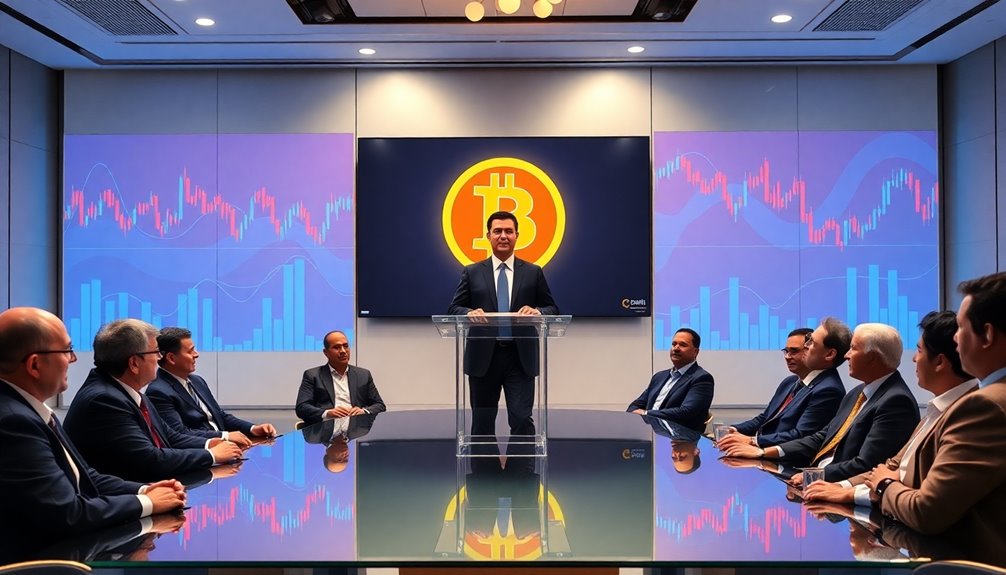Coinbase CEO Brian Armstrong urges world leaders to build Bitcoin reserves, emphasizing its role as a strategic asset. Many countries, like Brazil and Russia, are already exploring this avenue to hedge against inflation and economic uncertainty. With Bitcoin's volatility decreasing, it's become a more stable investment choice. Corporate giants such as Tesla are also adding Bitcoin to their reserves, showcasing its growing acceptance. Armstrong believes that adopting Bitcoin can shift global economic power dynamics, enhancing not only financial resilience but also future growth. If you want to understand the full implications of this, you'll want to explore further.
Key Takeaways
- Coinbase CEO advocates for global leaders to recognize Bitcoin as a strategic asset and hedge against inflation.
- The increasing adoption of Bitcoin by governments, such as Brazil and El Salvador, highlights its potential as a reserve asset.
- Regulatory changes, including the EU's MiCA regulation, create a more structured environment for Bitcoin reserves.
- Corporate investments in Bitcoin, led by firms like MicroStrategy, demonstrate its growing acceptance in treasury management.
- The stable price environment of Bitcoin, with low volatility, may encourage world leaders to consider it for their reserves.
Global Bitcoin Reserve Strategy

As governments and corporations increasingly recognize Bitcoin's potential, countries like Brazil, Russia, and Poland are exploring the establishment of their own Bitcoin reserves. You're witnessing a growing interest in Bitcoin as a strategic asset, with corporate giants like MicroStrategy holding substantial amounts. This trend indicates a shift in how nations perceive value storage, positioning Bitcoin as a hedge against inflation and a tool for economic freedom. Furthermore, the increasing interest in Bitcoin as a reserve asset among various nations underscores its importance in reshaping the global financial landscape. States like Oklahoma are backing initiatives to invest in Bitcoin, reflecting broader acceptance. By holding Bitcoin, countries could gain competitive advantages in the digital economy, potentially shifting global power dynamics. With mainstream adoption on the rise, the call for clear regulatory frameworks becomes essential to support innovation and ensure a stable future for cryptocurrency.
Regulatory Changes Impacting Cryptocurrency

While the landscape of cryptocurrency continues to evolve rapidly, regulatory changes are playing a crucial role in shaping its future.
You've likely noticed the European Union's MiCA regulation establishing comprehensive oversight, along with the OECD's new standards for cross-border tax reporting.
In the U.S., the formation of a crypto advisory council hints at a more structured federal framework, while states like Wyoming and Texas lead with progressive legislation. Additionally, the rising interest in Gold IRAs as a hedge against economic instability reflects a broader trend of investors seeking alternative assets.
Brazil's central bank is tightening regulations to combat scams, contrasting with El Salvador's bold move to adopt Bitcoin as legal tender. Notably, the increased urgency for regulations has emerged following bank collapses linked to crypto activities, highlighting the need for a cohesive regulatory approach globally.
As countries strive for regulatory harmony, the push for clarity in roles among agencies like the CFTC and SEC becomes vital for the industry's stability and growth.
Bitcoin Price Volatility Analysis

Understanding Bitcoin's price volatility is crucial for anyone looking to navigate the cryptocurrency market effectively. In 2023, Bitcoin's realized volatility hit historic lows, dropping below 50% for the first time. This decline coincided with a rising market cap, showing that interest in Bitcoin remains strong. Interestingly, low volatility often precedes significant price increases, as seen in previous trends. Factors like supply and demand, investor sentiment, and regulatory uncertainty drive volatility, making it essential to stay informed. Recent trends indicate that Bitcoin's historical volatility has significantly decreased, suggesting a more stable environment for investors.
Compared to traditional assets, Bitcoin's fluctuations can be less severe, particularly during market stress. However, media coverage tends to amplify perceptions of volatility, so keeping a level head is key when investing in this dynamic space.
Corporate Bitcoin Investment Trends

Bitcoin's price volatility has captured the attention of both investors and corporations, highlighting the growing interest in digital assets.
Recent regulatory changes, like ASU 2023-08, simplify financial reporting for Bitcoin, encouraging more companies to invest. With around 70 public firms, including Tesla and Coinbase, holding Bitcoin, the trend is clearly gaining traction. Approximately 70 publicly listed companies are now leveraging Bitcoin as a treasury reserve asset to mitigate risks associated with inflation.
Private companies like SpaceX also contribute to this movement, collectively holding significant amounts. By adding Bitcoin to their treasuries, corporations diversify risks and hedge against inflation while enjoying liquidity and flexibility.
This corporate embrace not only boosts demand for Bitcoin but also solidifies its role as a strategic asset, reshaping the market landscape and enhancing treasury resilience in an evolving economic environment.
Government Cryptocurrency Adoption Trends

As governments around the world explore the potential of cryptocurrencies, many are recognizing the strategic advantages of integrating digital assets into their economic frameworks.
You’ll notice that regulatory environments are shifting, especially under new SEC leadership that may favor pro-crypto policies. Countries like El Salvador and Argentina are already considering Bitcoin for their reserves, viewing it as a hedge against economic uncertainty. Additionally, the anticipated repeal of SEC's Staff Accounting Bulletin is expected to ease bank engagement with crypto, further encouraging this trend. However, central banks still seek legal clarity and must assess crypto-assets’ viability as reserve assets, balancing concerns over liquidity, safety, and market volatility. As nations navigate this evolving landscape, the implications of fed policy on bitcoin reserves will be closely monitored by both investors and financial institutions. A shift toward accepting Bitcoin as a legitimate reserve asset could redefine traditional banking practices and reshape global financial stability. This paradigm shift could also lead to increased adoption of cryptocurrencies as part of diversified asset portfolios, underscoring the need for clear regulatory frameworks to support innovation while safeguarding market integrity.
This evolving landscape signals a significant shift toward embracing cryptocurrencies in national economic strategies.
Long-Term Bitcoin Reserve Benefits

While many investors seek stability in their portfolios, incorporating Bitcoin as a long-term reserve can offer significant advantages. By holding Bitcoin, you can hedge against dollar devaluation and inflation, ensuring your assets maintain value over time. This digital gold acts as a robust store of value, enhancing your financial resilience. With Bitcoin's potential for long-term appreciation, the returns can surpass traditional assets, making it a low-downside investment. Moreover, supporting Bitcoin fosters innovation and positions the U.S. as a leader in the digital economy, attracting entrepreneurs and enhancing global competitiveness. Ultimately, investing in Bitcoin not only benefits your portfolio but also influences the broader economic landscape, promoting international cooperation and setting a trend for other nations. The proposed Strategic Bitcoin Reserve initiative aims to integrate Bitcoin into the national financial strategy, highlighting its increasing importance.
Frequently Asked Questions
How Can Individuals Buy Bitcoin for Personal Reserves?
To buy Bitcoin for your personal reserves, you've got several options.
You can register on a cryptocurrency exchange like Coinbase or Kraken, deposit funds, and buy Bitcoin directly.
Alternatively, find a Bitcoin ATM nearby to purchase with cash.
Peer-to-peer platforms like Paxful allow you to trade directly with others.
Lastly, consider investing in Bitcoin ETFs through a traditional brokerage for a more conventional approach.
Always check fees and security measures!
What Is the Environmental Impact of Bitcoin Mining?
The environmental impact of Bitcoin mining is significant.
You should know that it consumes about 0.5% of the world's energy, producing around 22 million metric tons of carbon dioxide annually. A large portion of this energy comes from fossil fuels, increasing its carbon footprint.
Additionally, Bitcoin mining generates considerable electronic waste due to the short lifespan of mining hardware.
Understanding these impacts can guide more sustainable practices in the cryptocurrency space.
Are There Security Risks in Holding Bitcoin?
Holding Bitcoin's like walking a tightrope—exciting yet risky!
You face several security threats, including phishing scams that target new investors, man-in-the-middle attacks intercepting your communications, and even physical theft of your devices.
Advanced malware can also compromise your credentials.
To safeguard yourself, use secure practices like strong passwords, two-factor authentication, and avoid public Wi-Fi for transactions.
Staying informed and vigilant can help you navigate these dangers effectively.
How Does Bitcoin Compare to Traditional Currencies?
When you compare Bitcoin to traditional currencies, you'll notice significant differences.
Bitcoin's decentralized nature means it's not controlled by any government, while traditional currencies are centralized and regulated.
Bitcoin's supply is finite, capped at 21 million, whereas traditional currencies can be printed at will.
Additionally, Bitcoin transactions occur 24/7, offering accessibility that traditional currencies lack.
However, Bitcoin's volatility and limited acceptance can make it less predictable and stable than traditional money.
What Are the Tax Implications of Bitcoin Investments?
When it comes to Bitcoin investments, you're in for a wild ride.
You'll face capital gains tax on profits, with rates varying based on how long you hold it. Short-term gains are taxed as ordinary income, while long-term gains can hit 0%, 15%, or 20%.
If you're mining or earning crypto, that income's taxed too.
Don't forget, you could be taxed multiple times—so keep your tax strategy sharp!
Conclusion
As you consider the future, remember: building Bitcoin reserves can bolster financial stability, enhance economic resilience, and drive innovation. By embracing this digital asset, world leaders can protect their nations, empower their citizens, and secure a competitive edge in the global economy. The time to act is now. Don't let hesitation hold you back; seize the opportunity to shape a stronger, more prosperous future for all. Bitcoin isn't just a trend—it's a transformative strategy.

















